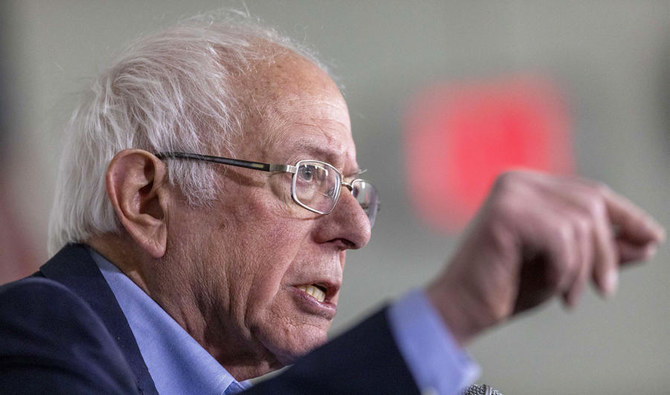WASHINGTON: Democratic presidential candidate Bernie Sanders on Friday warned Russia to stay out of US elections after American officials had told him Moscow was trying to aid his campaign.
“The intelligence community is telling us they are interfering in this campaign, right now, in 2020. And what I say to Mr. Putin, if elected president, trust me you are not going to be interfering in American elections,” Sanders told reporters in Bakersfield, California.
Sanders, 78, a democratic socialist from Vermont, is considered the front-runner for the Democratic nomination and is favored to win the Nevada caucuses on Saturday.
The Washington Post on Friday, citing people familiar with the matter, said US officials had told Sanders about the Russian effort and had also informed Republican President Donald Trump and US lawmakers.
It was not clear what form the Russian assistance took, the paper said.
A congressional source confirmed intelligence officials have told lawmakers Russia appears to be engaging in disinformation and propaganda campaigns to boost the 2020 campaigns of both Sanders and Trump.
The source, however, cautioned that the findings are very tentative.
Sanders, a US senator, said he was briefed about a month ago.
“We were told that Russia, maybe other countries, are going to get involved in this campaign,” he told reporters. “Look, here is the message: To Russia, stay out of American elections.”
“What they are doing, by the way, the ugly thing that they are doing — and I’ve seen some of their tweets and stuff — is they try to divide us up,” he said. “They are trying to cause chaos. They’re trying to cause hatred in America.”
Moscow denies
The Kremlin on Friday denied Russia was interfering in the US presidential campaign to boost Trump’s re-election chances, following reports that American intelligence officials warned Congress about the election threat last week.
US intelligence officials told members of the House of Representatives Intelligence Committee in a classified briefing that Russia was again interfering in American politics ahead of November’s election, as it did in 2016, a person familiar with the discussion told Reuters on Thursday.
Since that briefing, Trump has ousted the acting intelligence chief, replacing him with a political loyalist in an abrupt move as Democrats and former US officials raised the alarm over national security concerns.
A senior administration official, however, said the nation was better positioned than in 2016 to defend against foreign attempts to influence elections.
“President Trump has made clear that any efforts or attempts by Russia, or any other nation, to influence or interfere with our elections, or undermine US democracy will not be tolerated,” the official said.
On Twitter, the president accused Democrats in Congress of launching a misinformation campaign that says Russia prefers him to any of what he called the “Do Nothing Democrat candidates.” Trump called it a “hoax.”
Russian accounts
Facebook said it has not seen any evidence of Russian assistance to Sanders’ campaign. In October, the company took down Russian-backed accounts that pretended to be from political battleground states.
Some of those accounts used Instagram to praise Sanders. Another used the #BlackLivesMatter hashtag and faulted Joe Biden on race issues.
Jessica Brandt of the Alliance for Securing Democracy, an organization that monitors foreign interference in US politics, said Russian state media and official social media accounts have been working to help Sanders by amplifying conspiracy theories that his Democratic rivals, the Democratic National Committee and the “corporate media” have been “rigging the system” against him.
“We can say with certainty that this is what the Russian government is pushing,” she told Reuters. “We’ve seen for some time Russian official channels promoting division within the Democratic Party.”
Warning signs
US officials have long warned that Russia and other countries would seek to interfere in the Nov. 3 presidential election, following Russia’s meddling in the 2016 campaign that ended with Trump’s surprise victory over Democratic rival Hillary Clinton.
US intelligence agencies concluded that the Kremlin used disinformation operations, cyberattacks and other methods in its 2016 operation in an effort to boost Trump, an allegation that Russia denies. Trump, sensitive to doubts over the legitimacy of his win, has also questioned that finding and repeatedly criticized American intelligence agencies.
On Friday, the Kremlin said the latest allegations were false.
“These are more paranoid announcements which, to our regret, will multiply as we get closer to the (US) election,” Kremlin spokesman Dmitry Peskov told reporters. “They have nothing to do with the truth.”
Russia’s alleged interference sparked a two-year-long US investigation headed by Special Counsel Robert Mueller.
Mueller found no conclusive evidence of coordination between Russia and the Trump campaign. He also pointed at 10 instances in which Trump may have attempted to obstruct his investigation, as Democrats alleged, but left any finding of obstruction to Congress.


























